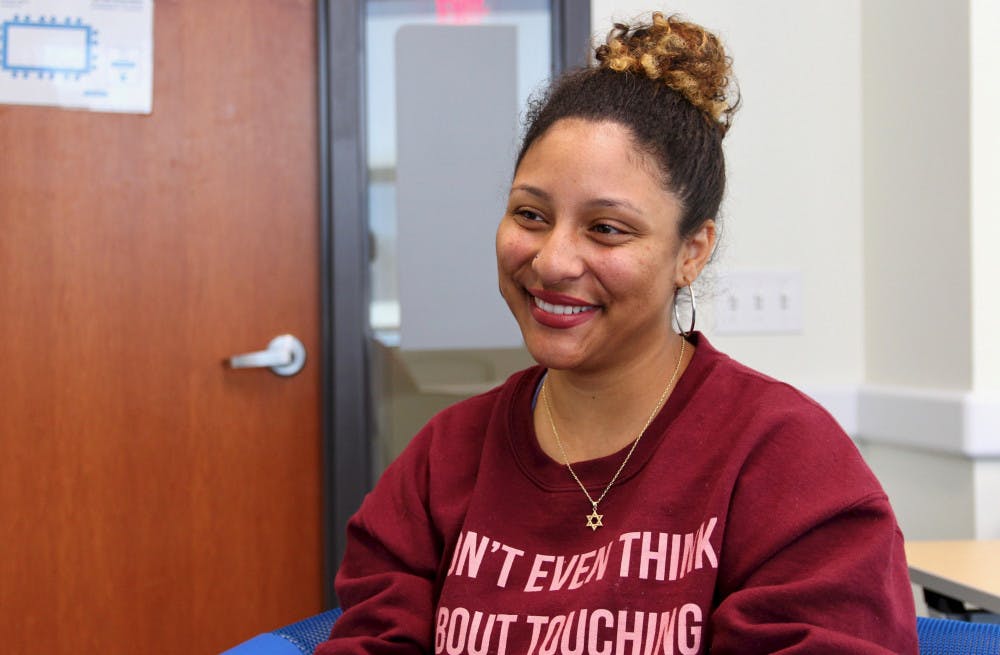The first time Jessica Grobman told anyone about her medical secret was in sixth grade when she shared it with her middle-school best friend.
The 11-year-old and her friend peered at a computer monitor in their school’s media center as Grobman spelled out H-I-V on the keyboard.
“What’s that?” her friend asked.
“I don’t know, but I have it,” she replied.
Grobman, who was born with the disease after contracting it from her mother, didn’t know it when she typed those letters. But 12 years later, as a social worker having graduated from UF with a Bachelor of Arts in education, she’d be shocked to see her disease had become undetectable. Although she was not exactly cured, it was close enough.
She grew up in Boynton Beach with supportive parents who reminded her every night, at precisely 7 p.m., to take her nightly pill. They did their best to make sure she stayed healthy, she said.
But when she visited her doctor, she was always the youngest in the waiting room.
“It has been a very lonely disease, a very lonely journey,” she said.
Outside of taking five daily pills and getting a monthly IV injection, she said she was just like the other kids.
“I didn’t really think that it was this huge thing, because nothing in my life was really affected by it,” she said. “I still did sports, I still went to school.”
She was just like the others until sex education was brought up in science classrooms and classmates became sexually curious in middle school. That’s when she realized she couldn’t do what others could because of the “big, scary thing,” she said.
*****
As Grobman learned about the stigma of her disease, she often felt discouraged to take the pills she needed.
“That was something that I really had to overcome,” she said. “Taking these pills wasn’t because there was something wrong with me to the outside world, but I really needed to do this to stay alive.”
Dr. Jennifer Janelle, who’s a part of UF Health’s Department of Infectious Diseases, said doctors can prescribe medications, but they can’t force you to take them, she said. It’s about living with the disease but to “not let it define you.”
Grobman said she first realized the importance of taking her own health seriously three months before graduating from UF. It happened when she was hospitalized for more than a week with salmonella after accidentally eating raw chicken.
She hadn’t taken her medication for four months before the hospital visit, she said, because sometimes she didn’t want to feel like she had the disease.
Dr. Janelle said HIV patients have a fluctuating T cell count, the count of a type of white blood cells that fight infections. Only when the count falls below 200 cells per cubic millimeter does the disease become AIDS. Grobman said her T cell count after contracting salmonella was about 280. A normal T cell count is 500 to 1,200, according to UF Health.
“I got myself together, and now I am where I am,” she said. “But I had to be pretty low for a little bit to learn that lesson.”
The lesson turned out to be quite valuable indeed.
In a routine blood test last Monday at the Alachua County Health Department, Grobman felt surprised when she found out her disease was undetectable despite her missing a few days of her preventive viral medication. In two months of treatment, her viral load — the number of copies of the HIV virus in her blood — dropped from 56,000 to 40.
In people with HIV, copies of the virus attack T cells and multiply, Dr. Janelle said. Health providers measure the viral count to monitor the disease. The viral count of an undetectable patient, such as Grobman’s, is fewer than 50.
HIV patients whose disease is undetectable have a lower risk of passing the disease to someone else, including during childbirth, as long as their viral count doesn’t increase.
*****
Grobman is now 23, and the disease isn’t as scary anymore. Instead, it’s become her secret weapon.
She uses the disease as a “character detector,” she said.
People make assumptions, and only a few have stuck around after she tells them she’s HIV positive. Although the virus is not transmitted through skin-to-skin contact, drinking from the same glass or even kissing, Grobman said some people don’t understand that and avoid her.
However, it all helps her only keep the people who truly care about her close.
Over the years, she’s grown less reserved about the virus, she said, especially when it comes to romantic relationships.
Josh Morales, Grobman’s current boyfriend, met Grobman through Tinder in December. When they began talking, she was very upfront about the disease, Morales said.
“The main thing in situations like this is just to talk about it, have a conversation,” Morales, 23, said.
Morales admitted he was a bit scared in the beginning, but as soon as he researched HIV and saw she was taking the necessary precautions to take care of herself, he became more comfortable with it.
The disease isn’t a burden so much as a part of Grobman that she embraces, she said.
“You got to love (the disease), if you love me,” she said. “It’s not going away. Knock on wood, I pray I get cured, but if I don’t, that’s something that we’re going to be dealing with together.”
Contact Elliott Nasby at enasby@alligator.org. Follow him on Twitter at @_ElohEl.
Jessica Grobman






